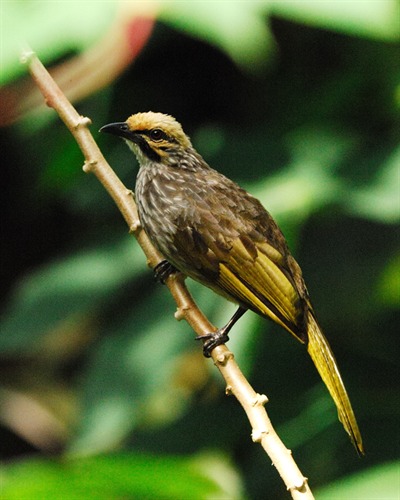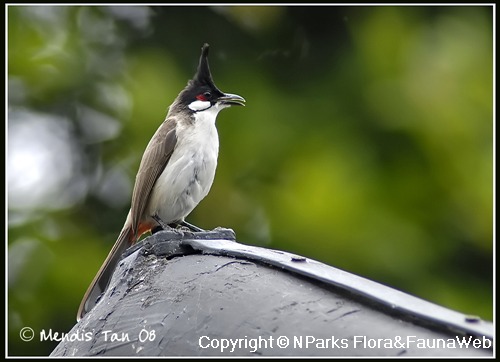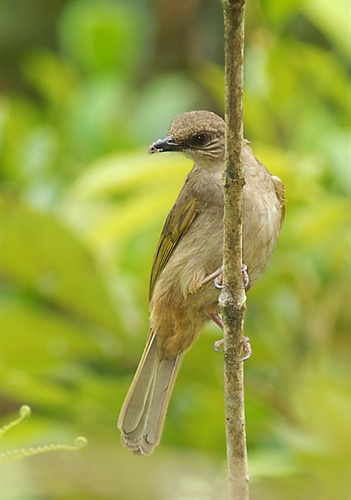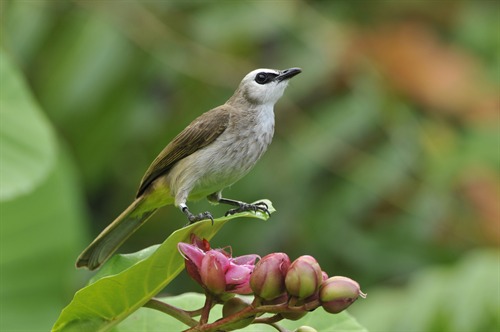
Back
Pycnonotus zeylanicus (Gmelin, 1789)
| Family Name: | Pycnonotidae |
| Taxonomic Group: | Vertebrates (Bird) |
| Common Name: | Straw-headed Bulbul |
Name
Ecology, Habitat & Location
| Ecological Notes | Found in forest, mangroves, and cultivated areas, usually near rivers. This species is the largest of the Southeast Asian bulbuls and like most of its congeners, is essentially arboreal. It is rather gregarious and garrulous, and is a general feeder. The nest is a flimsy cup built high on a tree and the usual clutch size is two. It breeds from December to August. Two or three populations are known to exist. Pulau Ubin has the largest population, followed by the scattered sites within the main island centred in the centre, north and western parts. |
|---|---|
| Habitats | Forest, Mangroves |
| Distribution | Pulau Ubin, Bukit Timah Nature Reserve, Mandai Road, Bukti Batok Nature Park, Bukit Brown, Sembawang, Mandai, Khatib Bongsu, Stagmont Ring, Malcolm Park, Springleaf woodlands, Sarimbun and the Western Catchment and Tanglin woods. Elsewhere, it is known from the Malay Peninsula, Sumatra, Borneo and Java but facing widespread poaching attempts. |
| Nature Reserves | Bukit Timah Nature Reserve |
| Nature Areas | Pulau Ubin, Western Catchment Area |
Conservation
| Trends & Threats | Poaching and habitat loss are the greatest threats to this species. The most viable site is Pulau Ubin which has 50% of the total population in Singapore. The area is protected under the Singapore Green Plan 2012 but is vulnerable to future development plans. Considered globally threatened by Birdlife International. |
|---|---|
| Scientific Interest & Potential Value | An interesting example of duetting by a songbird. The species is highly threatened in neighbouring countries and it is classified as Globally Threatened, yet the Singapore population seems to be growing. |
| Conservation Notes | Population 100-200 birds. Pulau Ubin and Bukit Batok, the two most critical sites for this species, and Bukit Timah Nature Reserve are listed as protected areas in the Singapore Green Plan 2012. Vigilance against poaching is also critical in ensuring its long term survival in Singapore. More of the sites where this species is found should be protected, especially since this species is globally threatened. |
Status
| Species Status | Resident |
|---|---|
| Conservation Status | Uncommon |
| Singapore Red Data Book Status | Endangered (EN) [2008] |
Photos
References
| References | Davison, G.W.H., Ng, P.K.L. & Ho, H.C (Eds.). 2008. The Singapore Red Data Book (2nd Edition). Singapore: Nature Society (Singapore). 285pp Lim, K.S. & Gardner, D. 1997. Birds: An illustrated field guide to the birds of Singapore. Singapore: Sun Tree Publishing Limited. 226pp Wang, L.K. & Hails, C.J. 2007. An annotated checklist of the birds of Singapore. Raffles Bulletin of Zoology Supplement no. 15. 179pp |
|---|




